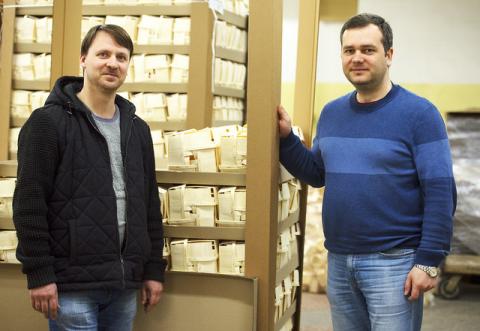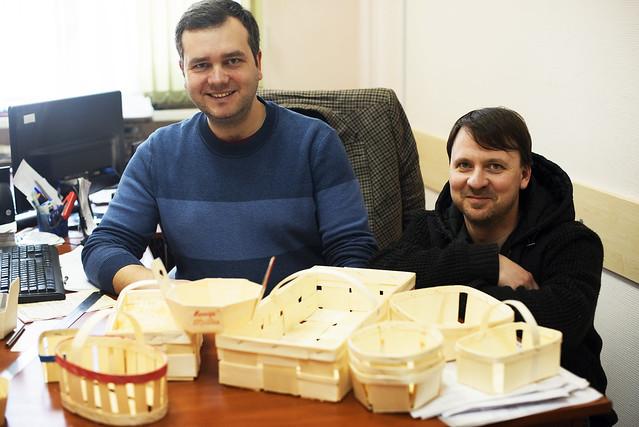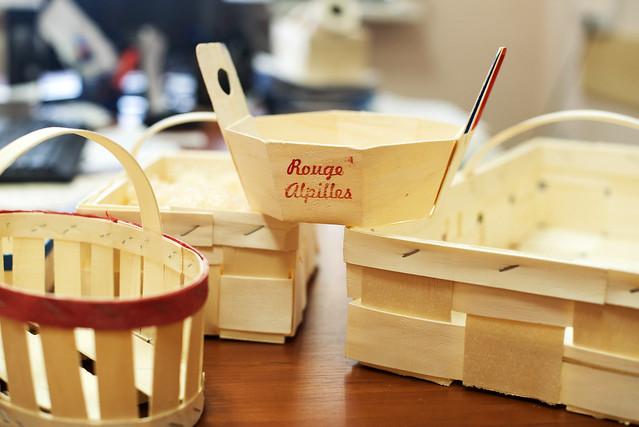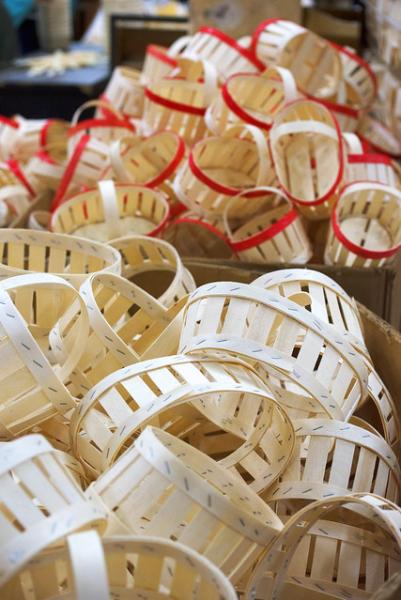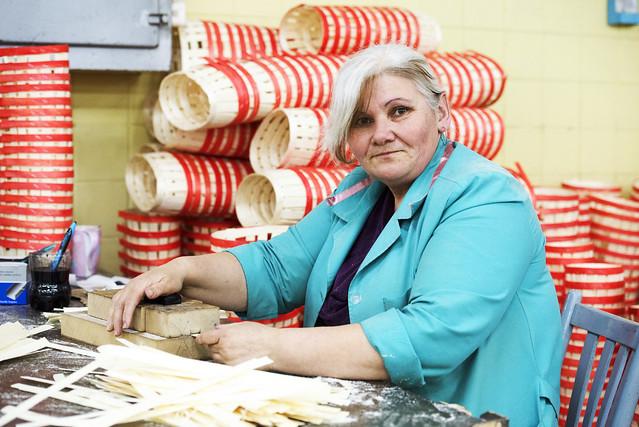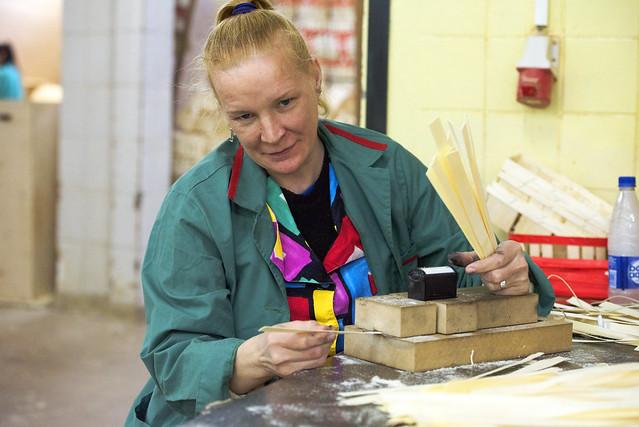Ecoupack, a Belarusian enterprise near the city of Hrodna, started using a new automated production management system known as ‘Gulf Stream’, thanks to support from the European Bank for Reconstruction and Development (EBRD) programme ‘Advice for Small Businesses’. This support, which covered 60% of the total cost of the implementation and was provided within the framework of the EU4Business initiative, funded by the European Union, has been a game changer for Aliaksandr Danilau and Uladzislau Kazlousky, the two young entrepreneurs whose company producing special packaging for fruit and vegetables has grown almost six-fold in the past three years.
Ecoupack currently employs 120 people who work in shifts, with 100 people working on production lines. Over the course of one shift, one worker can produce up to 1,000 small packages or up to 300 large ones. The baskets are made from aspen, a natural antiseptic which preserves fruits and vegetables in their fresh state for a long time. The production process is environmentally friendly, and the packaging is completely biodegradable.
Why not us?
Business partners Aliaksandr and Ulad, who are also good friends in real life, recall how they started their company: “If we don’t take into account our first attempts to set up a simple buy-sell business, when we were selling mushrooms, bicycles and other whatnots, then we can say our business was launched in 2008, when we started manufacturing actual goods.” They started by making cardboard boxes, because Ulad knew how to produce them. The two friends invested everything they had into the new business, and started working with a team of four people. And when they find themselves in need of another innovation today, they develop it themselves — it has now become a habit. Initially, they relied on bank loans to sustain them, reinvesting every penny they had left after interest payments back into the company.
In 2015, the partners set up an international transportation company, and one day, while returning to Belarus with a batch of goods in wooden baskets, they wondered: “Why don’t we start making such packaging ourselves?” That was how Ecoupack was born, and production began in 2016. To find their first clients, the entrepreneurs started calling up various Polish companies, and quickly succeeded. They went on a study visit to their first Polish client, who showed them the right way to produce, stack and transport the baskets. After this, they found a number of other partners online. Today, 95% of their goods are sold to France, and the rest to Spain and Germany. The company mainly caters for the needs of agricultural businesses and fruit and vegetable producers. They are set to hit the two million euro target for turnover this year. They could expand production further, but need investments in order to purchase new equipment and rent additional spaces. “Of course, we will also need to hire more people,” notes Aliaksandr.
Gulf Stream Makes it Faster
Any growing business requires effective management. The newly implemented Gulf Stream programme helps the company to streamline its work time records, ensure fair distribution of workload between employees, keep accounting and technical documentation in one place and effectively manage the customer base. Ulad notes: “We have already felt the difference. Previously, the line managers would distribute tasks on a whim, but now they analyse input data carefully, so all employees know what is expected of them, and that their work will be more efficient overall. When we first heard about the EBRD ‘Advice for Small Businesses’ programme, we could not believe this was possible,” says Aliaksandr. “We can give all our time to producing actual baskets rather than researching information."
Like many other entrepreneurs, Uladzislau and Aliaksandr love developing new skills. Having conquered the packaging market, the friends are now thinking about producing kitchenware for catering companies, as this is a growing trend at the moment. They have nice samples of veneer forks and spoons laid out on the table in the office where we sit down for our interview.
The two businessmen get their inspiration from business trips they take to their customers, who give them new ideas in addition to new contracts. They also enjoy learning new things. For example, after taking a business trip to the south of France, they both began to learn French in order to be able to communicate with their customers more efficiently.
The company staff includes people of different age groups, with more women than men. While the employees are 45 years old on average, there are some over 60, and there are some like Maryaya Shamko, a new university graduate who is now responsible for sales and HR. She notes that working at Ecoupack is very easy, especially after the Gulf Stream system was introduced, and says the managers encourage continuous education and serve as a real inspiration to the staff, who follow their lead. Masha has now also decided to learn French. The company welcomes and trains not only young professionals and experienced workers, but also people with special needs. Ulad and Aliaksandr sent targeted job offers to organisations supporting people with disabilities, and Ecoupack offered internship and employment opportunities to them. As a result, there are now two people with disabilities on the staff.
Aliaksandr and I walk through the production department to take photos of the plant, and, as soon as we find a good place to shoot his portrait, the workers around start jokingly to tease him, saying the boss should have been wearing a nice suit and tie for the picture. It is clear that the company creates a very relaxed and friendly atmosphere, so that everyone can work smoothly and actually enjoy themselves in the process.
*******************
Funded by the European Union under the EU4Business initiative, the EBRD ‘Advice for Small Businesses’ programme has operated from 2011 first as a regional initiative covering the six Eastern Partnership countries, including Belarus and since 2017 as a national programme aiming at enhancing the competitiveness of SMEs in Belarus operating across a wide range of sectors, with a focus on regional development. It helps businesses to grow and develop by increasing entrepreneurial skills, financial literacy, and the ability to adjust to markets within and outside Belarus. It increases the capacity of SMEs at the local/rayon level in order to increase the contribution of SMEs to the country’s economic growth. The programme provides co-financing grants up to €10,000 to cover the costs of necessary expert advice, thus developing this type of services in the local markets. For companies striving to compete at international markets the programme provides know-how of highly experienced international industry experts. Since it began, the programme has helped over 350 enterprises in Belarus to improve their business.
By: Alyona Lis
The article was prepared within the framework of the EU4Business Initiative

